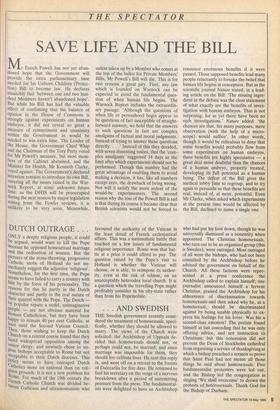DUTCH OUTRAGE . . .
ONLY a deeply religious people, it could be argued, would want to kill the Pope 'because he opposed homosexual marriage and the ordination of women. But the pictures of the stone-throwing, progressive Catholic mobs of Holland do not im- mediately suggest the adjective 'religious'. Nonetheless, for the first time, the Pope seems to have failed to carry a country with him by the force of his personality. The reasons for this lie partly in the Dutch character and partly in the real nature of their quarrel with the Pope. The Dutch by popular repute a stolid, unimaginative People — are not obvious material for Roman Catholicism, but they have been happy to remain 40 per cent Catholic, at least until the Second Vatican Council. Then, those wishing to keep the Dutch Church on a central course found that they faced widespread opposition among the senior clergy, and unwisely chose to im- Pose bishops acceptable to Rome but not acceptable to their Dutch dioceses. This Miley seems to have outraged Dutch Catholics more on national than on reli- gious grounds. It is not a new problem for /tome. For much of the 19th century the French Catholic Church was divided be- tween Gallicans and ultramontanists who favoured the authority of the Vatican in the least detail of French ecclesiastical affairs. This was a nationalistic battle that touched on a few issues of fundamental religious importance. Rome won that bat- tle at a price it could afford to pay. The question raised by the Pope's visit to Holland is whether the Vatican will choose, or is able, to reimpose its author- ity, even at the risk of schism, on an unacceptably heterodox local church. It is a question which the travelling Pope might profitably consider in his city-state rather than from his Popemobile.














































 Previous page
Previous page